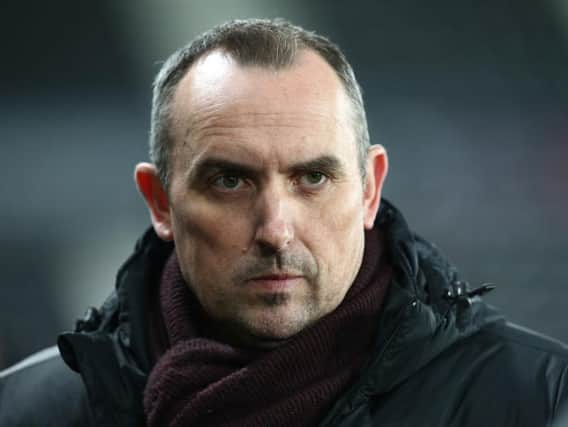Cobblers call for 'radical thinking' to avert future crisis


Cobblers chairman Kelvin Thomas says there needs to be some ‘radical thinking’ to ‘reset’ football beyond the coronavirus crisis, such as introducing salary caps and limiting the size of playing squads.
As football battles to get to grips with the financial turmoil caused by COVID, all kinds of proposals have been put forward to get spiralling costs under control and make the sport more sustainable across all levels in the future.
Advertisement
Hide AdAdvertisement
Hide AdThirty-seven of the 47 clubs in League One and Two recently signed a letter calling for salary caps to be introduced as early as next season, something which EFL chief Rick Parry would support.
Parry also revealed revealed on Tuesday that clubs in the EFL are facing a ‘£200m hole’ by September and he cannot say how many of those clubs could go out of business as a result of the coronavirus pandemic.
The Championship has been particularly hard hit with wage bills thought to represent a massive 107 per cent of turnover, which is ‘completely and utterly unsustainable’ according to Parry.
But the Cobblers are certainly not immune from the financial fallout of COVID and, like many clubs in the bottom two divisions of the EFL, they are heavily reliant on match-day revenue and season ticket sales.
Advertisement
Hide AdAdvertisement
Hide AdThe latter represents a significant chunk of the club’s income but Thomas confirmed earlier this week that they will hold fire before putting next year’s season tickets on sale.
However, Thomas has long since been an advocate of shaking up football’s financial structure and he feels now is a good opportunity to make some ‘radical changes’ that would benefit the game in the long-term.
“We’re very much in favour of some radical thinking in terms of changes for football in the long-term and what needs to happen,” he said.
“Reset is the buzzword in football right now and I think COVID has focused a lot more minds because there’s been discussions for a while about football needing a change and how it does business and its business model.
Advertisement
Hide AdAdvertisement
Hide Ad“But COVID has definitely focused minds on what needs to happen and as an industry, we need to make sure we are less owner-financed as businesses and football clubs and we need to give ourselves more opportunity to have retained earnings so we can cope with things like COVID or anything that happens.”
Speaking at the Department for Culture, Media and Sport committee on Tuesday, Parry explained how the EFL are looking at a number of proposals, including budget caps, limits on squad sizes and reforming the loan market.
“We need to make sure we keep an eye on competitive balance within the leagues as well and ensure that we do have that competitive balance,” added Thomas. “I think that’s something the Premier League has maybe lost its way in over the last few ways in terms of the money going into the clubs.
“League Two has a better competitive balance because nobody knows who’s going to win games and who’s going to win titles and promotions but in the Premier League tends to be more of a known quantity about who’s going to win games and who’s not.
Advertisement
Hide AdAdvertisement
Hide Ad“But there are a lot of things that need to be looked at such as salary caps, squad sizes and control of spending on players.
“Obviously our biggest expense is on the players, as with any football club, but we need to have some level of control so football clubs don’t put themselves in jeopardy and we can deal with these kind of situations better in the future.
“It’s not just about year-on-year either, we talk about financial sustainability a lot but financial sustainability isn’t just breaking even year on year and surviving, we need to give ourselves a chance to retain earnings so we have money in the bank to deal with these kind of crises.”
Thomas has also confirmed the Cobblers are hoping to retain all four loan players – James Olayinka, Callum Morton, Scott Wharton and Lloyd Jones – until the season ends, if it does.